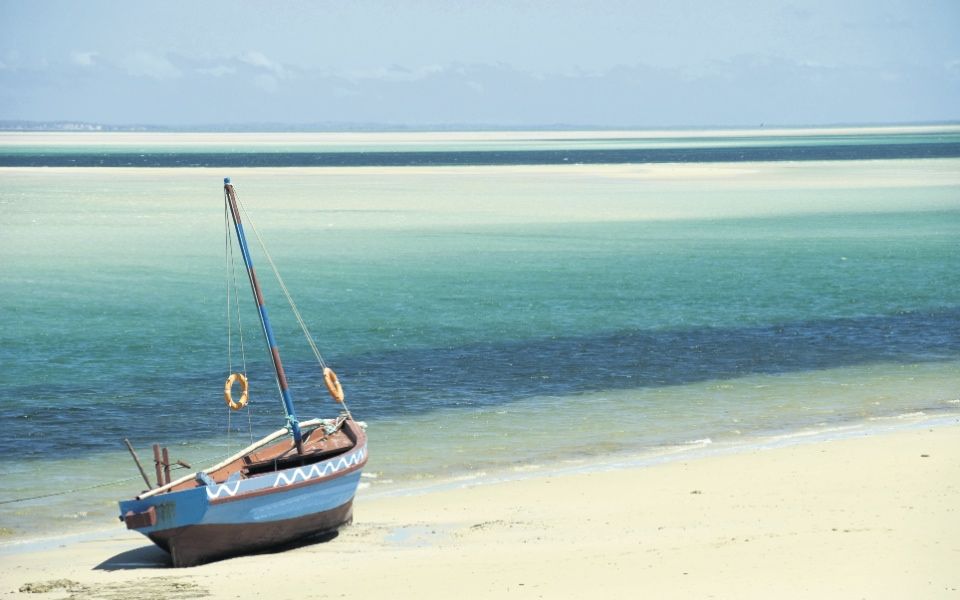Exploring the lost coastlines of Mozambique, one of Africa’s fastest growing tourist destinations

The southern African nation of Mozambique boasts one of the continent’s longest coastlines. It stretches for two and a half thousand kilometres along the Indian Ocean and is dotted with some of the best beaches on the planet, like the spectacular manta ray meeting point of Tofo and the coral reef enclosed bay of Pemba.
Bob Dylan was especially enamoured with the place, singing “it’s nice to stay a week or two” in his straightforwardly titled song, Mozambique. In defiance of the Nobel prize winner’s advice most visitors spend just a couple of days here – usually as a relaxing, sand-and-sea epilogue to a South African safari trip – but the destination is worth a visit in its own right.
Mozambique offers a refreshing alternative to the usual trappings of an African safari experience: the tour groups, the 4×4 convoys rolling across game parks and the oversized camera lens in your face.
Although decades of conflict have depleted the country’s national parks of big animals, the beaches and offshore islands remain pristine and untouched. It’s along these vast coastlines that the country’s outstanding natural beauty can best be viewed. Depending on the season, you’ll see whales breaching, turtles nesting and dolphins that happily let you swim in their company.
Colina Verde in the south of the country, and on the tip of the Machangulo Private Nature Reserve, is a house for six or more people to rent. It’s an ideal and lavishly furnished base for daytime saltwater fishing trips and in the evenings becomes a stylish venue for social gatherings.
The house is reached in less than an hour by speedboat from the capital city of Maputo, and looks out over the Indian Ocean. Incongruous amid the African bush, a tennis court is neatly etched into the grounds, while themed bedrooms and the opportunity to kayak in mangrove swamps and ride fat bikes on the beach add to the allure of this one-of-a-kind party place.

For barefoot luxury, head for Anvil Bay. Also on the Machangulo peninsula, this seven-mile stretch of beach is deserted save for the small number of exclusive guests staying under the thatched roofs of a few luxury tents nestled amongst the sand dunes and vegetation. Though miles from anywhere, there is nothing primitive about the accommodation, food or drink.
If you want more conventional luxury then the resort of White Pearl, with bungalows and butlers, is a couple of hours’ drive away. It’s more European than African in its style and service, but there are turtles and dolphins to watch, horse-riding on the sand and lots of water-based activities.
Maputo is one of the fastest growing cities in the world, with its rapid development fuelled by billions of dollars of recent investment in offshore gas wells. At the same time it’s becoming more welcoming to tourists. Getting around to restaurants and seafront bars is easier than ever, and the country’s best restaurants are all found in Maputo’s five-star hotels: The Southern Sun, Radisson Blu and Polana Serene. If you like seafood, then locally caught, fresh crab, lobster, prawns and crayfish will bring you close to nirvana.
Mozambique’s poor infrastructure means most visitors spend their time in the south of the country, but if you can make it north then you should make it a goal to visit Ibo.
On this small island is a stone-built town that was once a thriving centre of the slave trade, before even the Portuguese colonised the country half a millennia ago. Its buildings are now mostly crumbling into ruins, some dating from the early 19th century.
A few of the structures are still habitable and three of the best preserved mansions now make up Ibo Island Lodge, an historic hostel that overlooks the scenic islands of the Quirimba’s Archipelago, which twinkle like strange jewels when viewed from the lodge’s rooftop bar. Activities here include snorkelling, fishing, kayaking, cycling, bird watching and Dhow cruises for day trips to the nearby islands.
Just one small corner of this beautiful country, Ibo is about as far from tourists’ radar as its gets in Africa, and yet another reason to give Mozambique the time it deserves. Bob clearly knew what was talking about.
Need to Know
Getting there: TAP Portugal (flytap.com 0345 601 0932) flies from London Heathrow & Gatwick to Maputo via Lisbon three times a week, prices start at £572 return including taxes.
Tour Operator: Mahlatini Luxury Travel (mahlatini.com 028 90736050) are the experts.
Getting around: Tour packages will organise the logistics, Maputo’s hotels have airport transfers and the websites for Machangulo accommodation explain their transport options. Getting to Ibo Island means a domestic flight with LAM (lam.co.mz) and a 20-minute charter flight with CRA Aviation (craviation.co.mz) or a private car-and-boat transfer through Baobibo (baobibo.com) or Miti Mitwiri (mitimiwiri.com).
Bring with you: Bradt’s Mozambique guide in your luggage and Roberts Birds of Southern Africa on your phone.